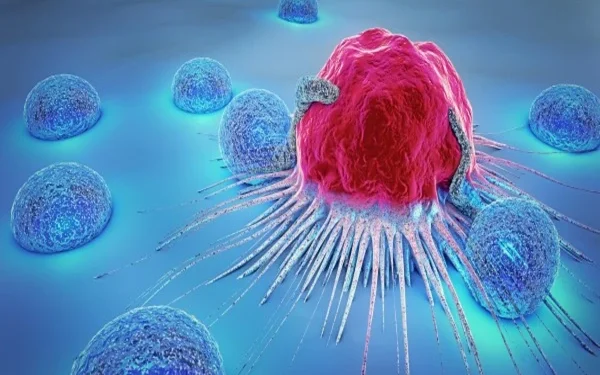Introduction: A New Hope in the Fight Against Breast Cancer
A groundbreaking new study has revealed that a novel breast cancer drug may halt the growth of tumors, offering a significant advancement in treatment and potentially delaying the need for chemotherapy. This development is seen as a major step forward in the battle against one of the most prevalent cancers affecting women globally.
The results come from the SERENA-6 clinical trial, which investigated the drug’s ability to target chemoresistant cancer cells — cells that have stopped responding to conventional cancer therapies. Scientists now believe this drug could transform treatment strategies for HER2-negative breast cancer, a subtype that comprises approximately 70% of all breast cancer cases worldwide.
What Is HER2-Negative Breast Cancer?
To understand the significance of this breakthrough, it’s important to understand the classification of breast cancers. Breast cancer is often categorized based on the presence or absence of three receptors: estrogen (ER), progesterone (PR), and human epidermal growth factor receptor 2 (HER2). HER2-positive cancers produce too much of the HER2 protein, which promotes the growth of cancer cells.
In contrast, HER2-negative breast cancers do not overexpress the HER2 protein. They tend to grow more slowly than HER2-positive cancers and are often treated with hormone therapies if they are hormone receptor-positive. However, HER2-negative tumors can still develop resistance to these therapies over time, making them difficult to treat using existing options.
SERENA-6 Trial: A Game-Changer in Breast Cancer Treatment
The SERENA-6 trial focused on assessing whether a new class of hormone therapy could stop tumor progression in patients with HER2-negative breast cancer, particularly those whose cancers had developed resistance to standard treatments. The study is being hailed as a “watershed moment” in oncology, potentially signaling a major shift in how breast cancer is managed in the future.
Key Findings of the Trial:
- Patients treated with the experimental drug experienced a 56% reduction in tumor growth compared to those receiving conventional therapies.
- The drug was effective against chemoresistant cancer cells, which are notoriously difficult to treat.
- Researchers used liquid biopsies — blood tests that detect cancer DNA — to identify early signs of treatment resistance.
- Early detection of genetic mutations through these blood tests enabled personalized intervention before the cancer became aggressive.
These findings underscore the importance of precision medicine — tailoring treatment to individual patients based on their genetic profiles.
Liquid Biopsy: A Revolutionary Approach to Monitoring Cancer
One of the most exciting aspects of the SERENA-6 trial is the use of liquid biopsy technology to track how cancer is responding to treatment. Unlike traditional biopsies, which require the surgical removal of tissue, liquid biopsies involve analyzing a blood sample for fragments of DNA shed by tumors.
Benefits of Liquid Biopsy:
- Minimally invasive: Reduces the need for painful surgical procedures.
- Real-time monitoring: Helps doctors detect changes in cancer earlier.
- Personalized treatment: Enables oncologists to modify treatment strategies based on how the cancer evolves.
Scientists in the SERENA-6 trial used this technique to detect mutations in the estrogen receptor gene (ESR1) — a common marker of resistance in hormone-receptor-positive, HER2-negative breast cancer. By identifying these mutations early, doctors were able to intervene with the new drug before the tumors could grow or spread further.
The Role of Hormone Therapy in Breast Cancer
Hormone therapy plays a crucial role in treating estrogen receptor-positive (ER-positive) breast cancer, a common subtype of HER2-negative disease. These cancers rely on estrogen to grow, and treatments are often designed to block estrogen production or prevent it from binding to cancer cells.
However, over time, many patients develop resistance to hormone therapy, rendering it ineffective. This is where the new drug, studied in SERENA-6, comes into play. By targeting the mutated ESR1 gene, the drug can restore hormone sensitivity, offering patients a renewed chance at controlling the disease without resorting to chemotherapy.
Expert Reactions: A Watershed Moment
Medical experts and oncologists around the world are celebrating the SERENA-6 findings as a pivotal moment in cancer care. A leading cancer professor, involved in the trial, stated:
“This is a watershed moment in breast cancer treatment. For the first time, we can predict when hormone therapy may stop working and intervene before the disease progresses. It could help thousands of women delay or avoid chemotherapy altogether.”
The ability to avoid chemotherapy — which is often associated with severe side effects such as fatigue, hair loss, and increased infection risk — could dramatically improve quality of life for breast cancer patients.
What This Means for Patients
If further trials confirm these results, the new drug could redefine the standard of care for HER2-negative breast cancer. Currently, once patients become resistant to hormone therapy, they often have limited options besides chemotherapy.
The introduction of a targeted therapy that can delay or eliminate the need for chemo could:
- Extend progression-free survival
- Improve daily functioning and reduce hospital stays
- Reduce long-term treatment costs
- Empower doctors to make data-driven treatment decisions
The Road Ahead: Regulatory Approval and Access
While the results of the SERENA-6 trial are extremely encouraging, the drug still needs to undergo further regulatory evaluation before it can be made widely available. Additional Phase III trials will be needed to confirm its safety and effectiveness in a larger population.
Steps Toward Approval:
- Peer-reviewed publication of findings
- Review by regulatory authorities such as the FDA (U.S.) and EMA (Europe)
- Inclusion in treatment guidelines for breast cancer
- Insurance and healthcare system integration
Access to this medication will also depend on pricing and healthcare infrastructure, particularly in low- and middle-income countries where breast cancer remains a leading cause of death among women.
The Global Impact of Breast Cancer
Breast cancer is the most commonly diagnosed cancer in women worldwide, with over 2.3 million new cases reported annually, according to the World Health Organization (WHO). Despite advances in early detection and treatment, it remains a leading cause of cancer-related mortality, particularly when diagnosed at advanced stages or when treatment fails.
HER2-negative breast cancer, which constitutes the majority of cases, has seen limited innovation compared to HER2-positive types, making the SERENA-6 breakthrough especially significant.
Conclusion: A New Chapter in Breast Cancer Treatment
The results of the SERENA-6 trial have given new hope to millions of breast cancer patients globally. By using targeted hormone therapy informed by genetic testing, this drug offers the potential to outsmart cancer before it becomes resistant to treatment.
This research highlights the importance of early detection, personalized medicine, and innovation in oncology. If adopted widely, this drug could not only improve survival rates but also enhance the quality of life for countless women battling breast cancer.

























